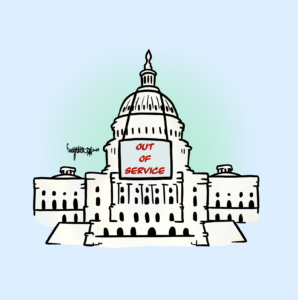
For the first time in nearly seven years, the federal government has entered its third week of a government shutdown, with no clear end in sight.
Each year, Congress must establish an agreement on a government spending plan before passing any laws or appropriation bills. Typically, Congress has two options: they can pass a continuing resolution (CR) — a temporary spending bill that allows the federal government to continue operating under last year’s budget until a final agreement is reached — or pass a full budget resolution, which establishes the recommended levels of spending and revenue targets for the upcoming year.
In Sept., the House of Representatives passed a CR, but it failed to advance in the Senate. As a result, Congress missed the Oct. 1 deadline — the start of a new federal fiscal year — which initiated the government shutdown.
The main point of contention in passing the budget is healthcare funding. Senate Democrats are withholding support for the GOP’s CR in an effort to push Republicans to extend Affordable Care Act (ACA) related premium tax credits set to expire on Nov. 1. Absent an extension, approximately 15 million people, including 2.4 million Californians, will lose affordable health care coverage.
Meanwhile, Republican leaders in both the White House and Congress are arguing that Democrats are advocating for “free healthcare for illegals” and blaming the Democrats for the government shutdown.
This standoff has become a political and partisan issue. Since Republicans control the House, Senate and White House, Democrats are unlikely to get what they want in the final budget from Republicans. However, by holding out, they may better position themselves for the upcoming midterm elections if Americans blame Republicans for the shutdown, the expiration of ACA tax credits and rising premiums nationwide.
Lost in this partisan standoff is the human cost, though. Regardless of whether Republicans succeed in passing yet another restrictive budget or Democrats use this as a political opportunity to strengthen their electoral prospects, millions of Americans are suffering due to the shutdown.
The shutdown is not just a political issue; it’s also an economic one. The longer it continues, the more it disrupts the economy, affecting businesses, investors and the overall financial stability of the country.
Like many Californians, I have never been particularly concerned when I heard about the federal government shutting down. The distance between California and Washington, D.C. made the issue feel remote, affecting me only through airport delays after clearing Transportation Security Administration (TSA) checkpoints.
As an intern on Capitol Hill this quarter, I’ve seen the direct impact of this shutdown. It’s no longer a distant issue, but a harsh reality affecting federal workers who have lost their jobs or are struggling to make ends meet. The shutdown is not just a political game, but a crisis that is leaving people uncertain about their future.
On Oct. 10, the Trump administration began laying off more than 4,000 federal workers across seven departments. The Treasury Department and Department of Health and Human Services account for more than half of the total layoffs.
Referred to as “reductions in force,” or RIFs, the American Federation of Government Employees and the AFL-CIO filed a lawsuit against the Trump administration for the mass layoffs. A federal judge in California temporarily blocked the firings, siding with the unions and stating that the terminations appear to be “politically motivated.”
As this situation drags on, pressure on Democrats is intensifying. President Trump announced that his administration plans to cut “Democrat programs,” including climate and infrastructure funding earmarked for states that voted for former Vice President Kamala Harris in last year’s election.
“That’s the way it works,” he said. “They wanted to do this so that we would give them a little taste of their own medicine.”
His quote is chilling. Rather than engaging with Democrats on a federal budget or finding a way to protect federal workers, President Trump and the Office of Management and Budget Director, Russell Vought, are imposing political punishment through budget cuts on those who disagree with them. These actions represent a gross overreach of authority and — unsurprisingly — are undemocratic behavior.
However, the most disturbing aspect of this standoff isn’t the political blame game, but the complete lack of empathy for federal workers losing their jobs, interns going unpaid, households at risk of losing healthcare and communities dependent on the programs that will be cut next week.
In school, we are taught that power resides with the people in a democracy. Citizens elect representatives to serve their interests, and they are expected to uphold the values of our democracy: justice, accountability and fairness.
Today, the ideal of democracy feels distant. People are being used as pawns in a cruel political game. Our jobs, health and futures are being used as bargaining chips in a struggle that values political advantage over public service. This is not just a power struggle between Republicans and Democrats, but a gross injustice where real lives are at stake.
Leadership without compassion or empathy is dangerous. It’s unjust for federal workers and millions of Americans to be used as collateral damage in a partisan conflict. We need leaders who prioritize their constituents over party interests.
It’s time for a change, a change that brings accountability and compassion back to our government.


